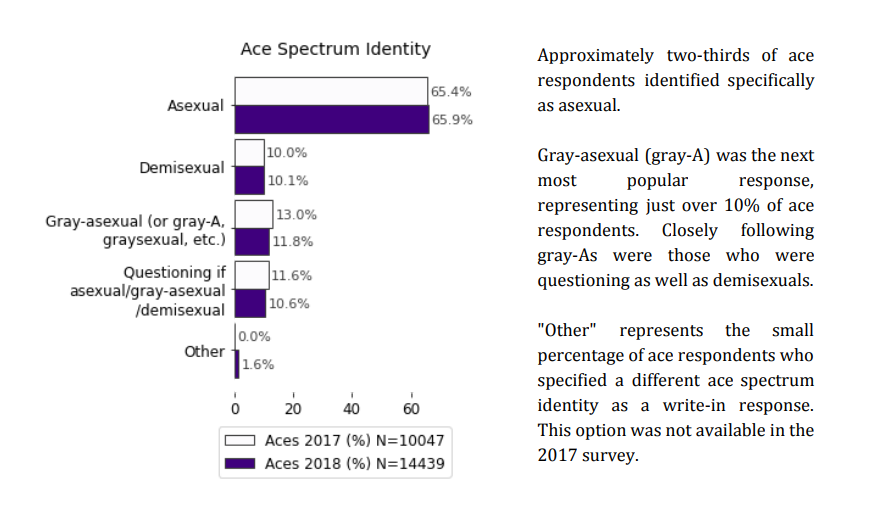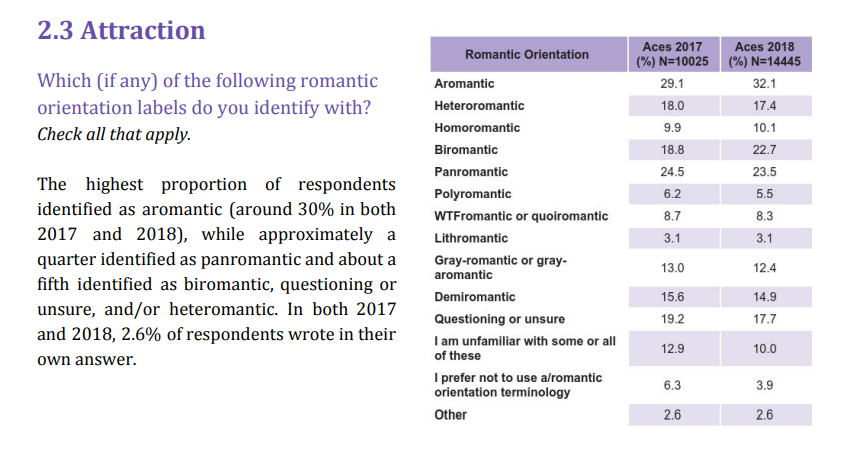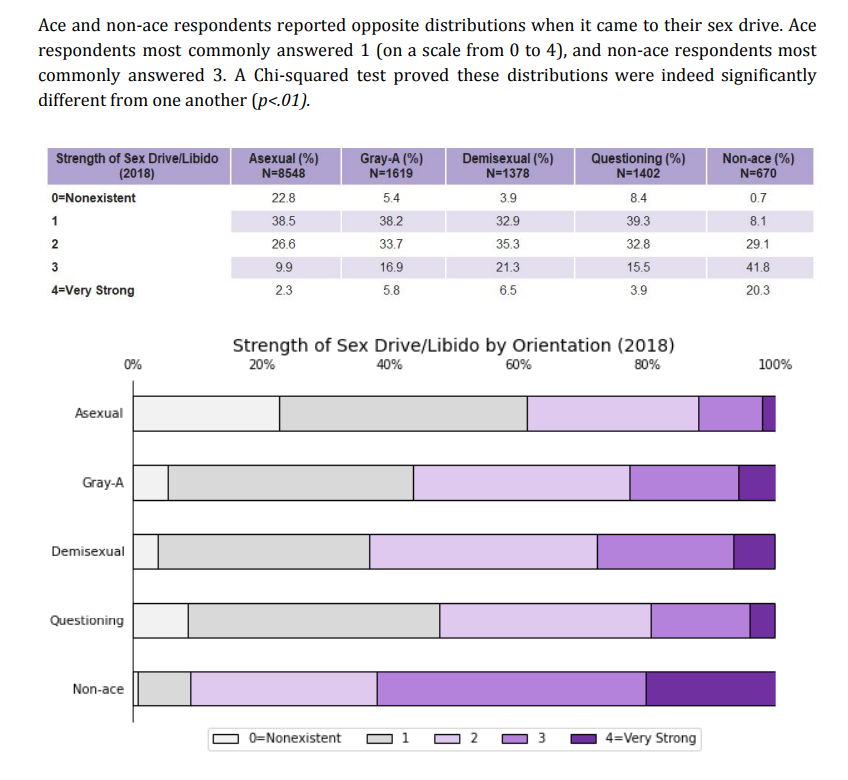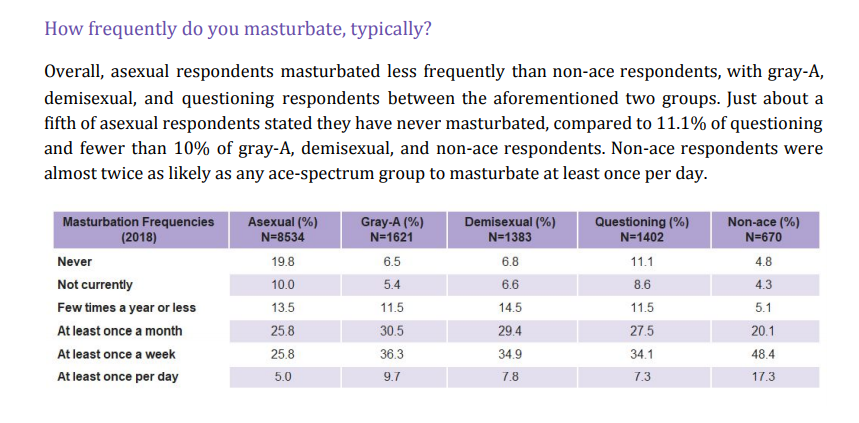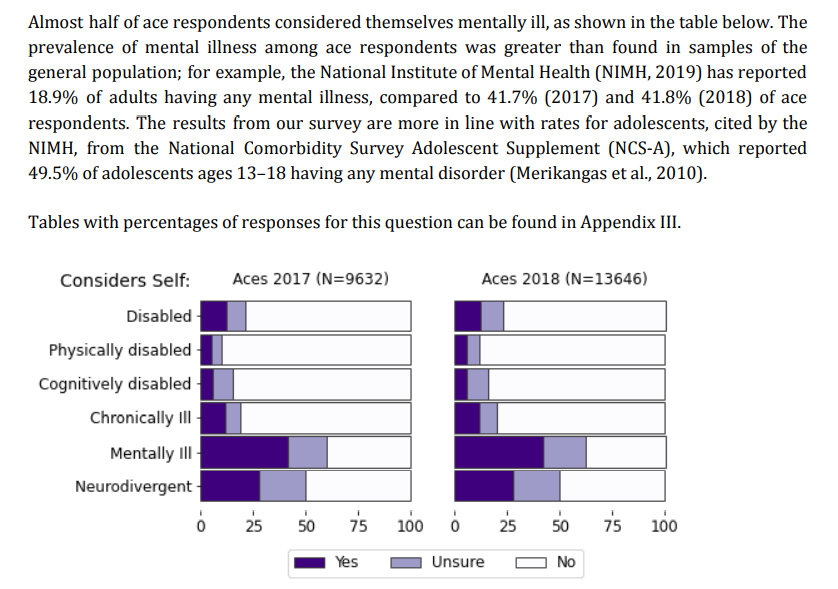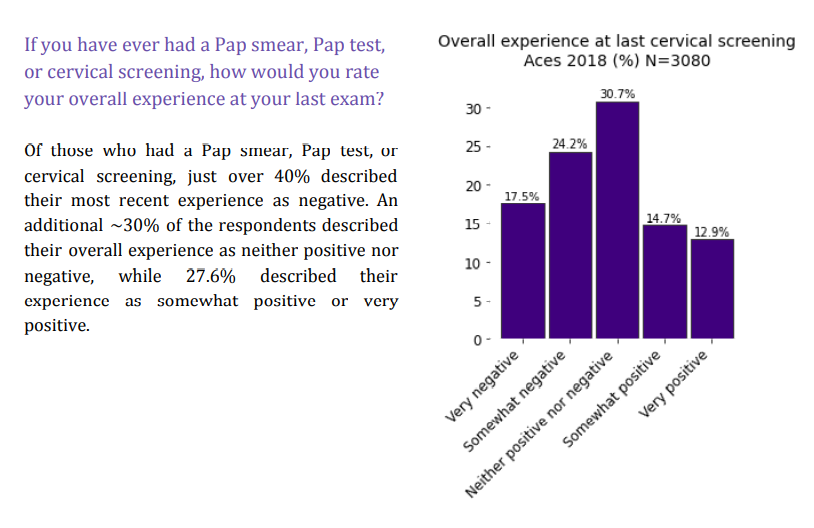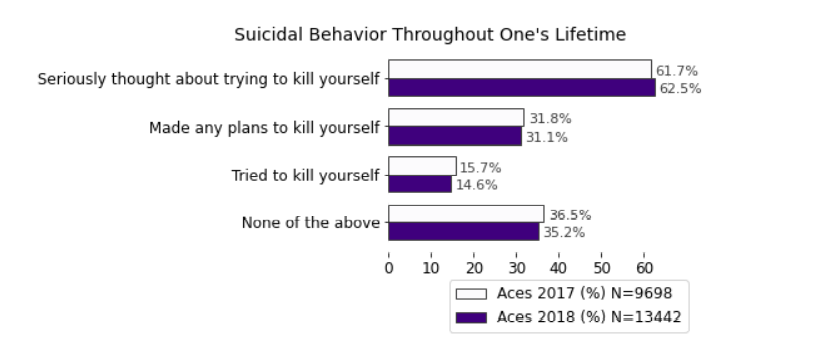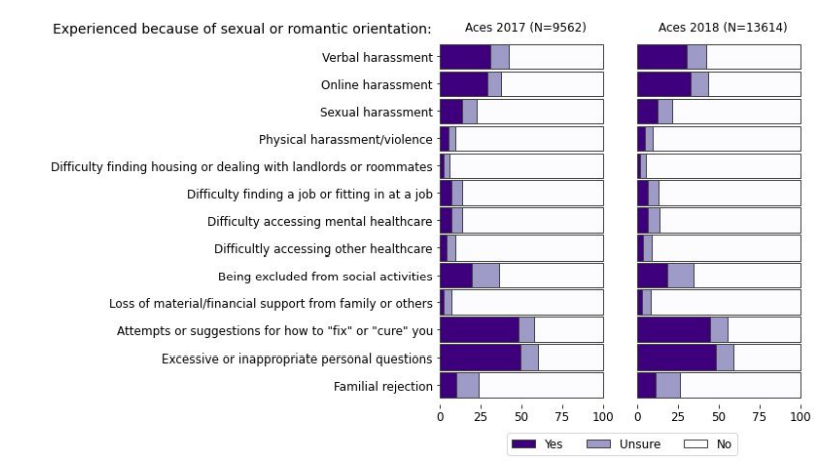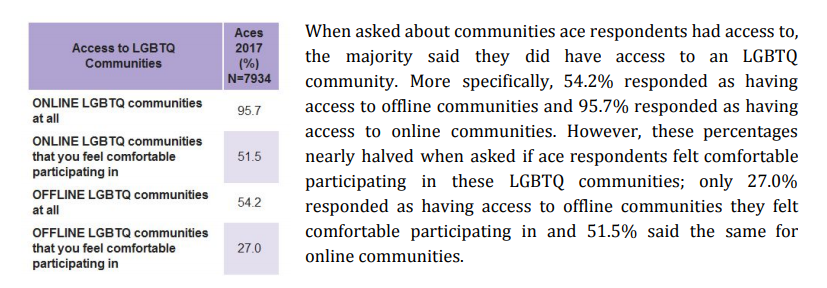Happy Ace Week! Are you familiar with the Asexual Community Census? It's a yearly survey, and it just released a report on the results from 2017 and 2018.
I figure it'd be fun to pull out some of the highlights! Full report is here: https://asexualcensus.files.wordpress.com/2020/10/2017-and-2018-asexual-community-survey-summary-report.pdf
I figure it'd be fun to pull out some of the highlights! Full report is here: https://asexualcensus.files.wordpress.com/2020/10/2017-and-2018-asexual-community-survey-summary-report.pdf
Note: Due to sampling techniques, it probably measures "ace-spectrum people in contact with online ace spaces" rather than "general population of ace-spectrum people."
Two-thirds of the ace respondents considered themselves queer. About one in six was questioning or unsure.
What about gender?
Roughly 60% of the aces who responded were women, 25% nonbinary or questioning, 15% men.
Roughly 60% of the aces who responded were women, 25% nonbinary or questioning, 15% men.
Side note:
Do people who aren't asexual realize what a large percentage of the ace community is nonbinary? I see asexuals often (maliciously?) assumed to be cis heteroromantic, which sometimes involves (deliberate or not) misgendering of nonbinary aces.
Do people who aren't asexual realize what a large percentage of the ace community is nonbinary? I see asexuals often (maliciously?) assumed to be cis heteroromantic, which sometimes involves (deliberate or not) misgendering of nonbinary aces.
Among the nonbinary genders respondents could choose from, the most frequently chosen after "nonbinary" was "agender."
The age of respondents skewed young, with the vast majority being between 13 and 30.
(I don't find this surprising -- younger people are more likely to be online and to have encountered resources related to asexuality)
(I don't find this surprising -- younger people are more likely to be online and to have encountered resources related to asexuality)
The report also compares the racial demographics of responses of American aces to the overall American demographics. The respondents skewed white and aces of color were underrepresented.
There are similar breakdowns for Canada and the UK.
There are similar breakdowns for Canada and the UK.
One-third of ace respondents discovered asexuality through Tumblr.
(There is probably a larger conversation to be had about the history of ace communities on Tumblr; I also wonder if it has the same impact on people discovering asexuality today)
(There is probably a larger conversation to be had about the history of ace communities on Tumblr; I also wonder if it has the same impact on people discovering asexuality today)
And in something I feel like we have to keep saying over and over again...
the majority of ace respondents do not identify as heteroromantic!
About 30% identified as aro, 25% as pan, and 19% as bi.
the majority of ace respondents do not identify as heteroromantic!
About 30% identified as aro, 25% as pan, and 19% as bi.
This fits with my own experience with the asexual community. I've noticed that the most common romantic orientations seem to be on the aro spectrum or bi/pan.
Maybe the romantic orientation data is different for offline ace spaces that may not have had contact with the survey?
But I feel like I most commonly see the "mostly heteroromantic" assumption in online spaces.
But I feel like I most commonly see the "mostly heteroromantic" assumption in online spaces.
Oh and just to be clear, I absolutely think that queer spaces should be inclusive of asexuals ***regardless of romantic orientation.*** The experiences of any asexual, heteroromantic or not, are not the same as the experiences of someone heterosexual.
In 2017, the average age ace respondents came out was 21. In 2018, that dropped to 20.
(This might be impacted by survey methods, but I also think the ace community might skew young, simply because younger generations are more likely to know about asexuality)
(This might be impacted by survey methods, but I also think the ace community might skew young, simply because younger generations are more likely to know about asexuality)
The report cites a survey that found that asexual students were less likely to be out than all LGBTQ students.
(I would love love love more LGBTQ studies to include data on asexual and aromantic populations, so I'm glad this one did!)
(I would love love love more LGBTQ studies to include data on asexual and aromantic populations, so I'm glad this one did!)
Also not surprising, asexual respondents were more likely to be out as asexual to non-heterosexual friends than heterosexual friends.
About three-quarters of ace respondents were not out to any medical professionals.
There are reasons for this! Saying "well they should come out" erases the safety reasons many are likely not out. Asexuality is still heavily medicalized.
There are reasons for this! Saying "well they should come out" erases the safety reasons many are likely not out. Asexuality is still heavily medicalized.
"Overall, ace LGBPQQ respondents were out to more people about their LGBPQQ identity than their
ace identity."
Offline, I am more likely to "present" myself as "just" a lesbian rather than both lesbian and asexual.
ace identity."
Offline, I am more likely to "present" myself as "just" a lesbian rather than both lesbian and asexual.
I live in a liberal area and it's generally easier to predict the outcome to "I'm a lesbian" than it would be to "I'm asexual."
While there are still risks to being out as a lesbian, it feels somehow less risky than saying I'm asexual.
While there are still risks to being out as a lesbian, it feels somehow less risky than saying I'm asexual.
Especially in any professional environment, if I reveal any of my queerness, it's my lesbianism. The only coworkers/supervisors who've ever known I'm asexual know it because we were Twitter mutals. This is not most!
... Okay, back to the report.
... Okay, back to the report.
Of ace respondents, 75% were currently single and 40% had never been in a relationship.
(Sort of comforting, since I've sometimes felt like one of the few perpetually single aces.)
(Sort of comforting, since I've sometimes felt like one of the few perpetually single aces.)
Asexuals mostly are dating allo people.
"More than 70% had only had non-ace partners, while just
over 5% had only had ace partners."
Makes sense, as there are wayyyyy more allo than ace people.
"More than 70% had only had non-ace partners, while just
over 5% had only had ace partners."
Makes sense, as there are wayyyyy more allo than ace people.
About a tenth of ace respondents identified as polyamorous.
Brief break while I continue to read the report and add to the thread.
Note. The next part of the report deals with sexual violence, so general TW: sexual assault for this section.
Note. The next part of the report deals with sexual violence, so general TW: sexual assault for this section.
And in a very depressing but not completely surprising response, around half of all ace people surveyed had experienced sexual violence. Aces of color were slightly more likely than white aces to experience sexual violence.
... Oh eff me, that was just the 2017 results. In 2018, the survey questions were reframed to more specifically define "sexual violence" according to CDC guidelines.
And then 80% responded that they'd experienced sexual violence.
And then 80% responded that they'd experienced sexual violence.
Here's a breakdown of more information about the types of sexual violence, along with respondents' races.
There's a lot more data in the report about sexual violence and sexual assault, but I'm not going to go through it all here.
The one last thing I'm going to pull out is that trans and nonbinary aces had higher rates than cis aces.
The one last thing I'm going to pull out is that trans and nonbinary aces had higher rates than cis aces.
Onto the section on consensual sex. Around 1/3 of respondents had had consensual sex, around 2/3 hadn't.
Here's the table with data from the question asking about sexual activity in the last year.
Here's the table with data from the question asking about sexual activity in the last year.
"Among asexual respondents, over half said they were repulsed, about a quarter said they were
indifferent, around 3% said they were favorable, and about 15% said they were uncertain"
indifferent, around 3% said they were favorable, and about 15% said they were uncertain"
One of the issues I see in the asexual community is trying to balance the needs of these different groups. Too often indifferent and favorable aces are erased, but efforts to combat that erasure can sometimes have negative implications towards sex-repulsed aces.
AKA "We're normal and can even want to have sex too!" which then implies it's not normal to not want to have sex.
This is similar to the treatment of aro aces in the community, and I see these two things as some of the main in-community issues.
This is similar to the treatment of aro aces in the community, and I see these two things as some of the main in-community issues.
Sexual attraction and sex drive are two different things. Someone who may experience no sexual attraction, may still have a sex drive/libido.
But overall, ace respondents reported lower level of sex drive than the allo respondents.
But overall, ace respondents reported lower level of sex drive than the allo respondents.
One of those invasive personal things that people often seem to want to know about ace-spectrum people is masturbation.
But if you are curious about general data trends (not asking individual aces), here's some info!
But if you are curious about general data trends (not asking individual aces), here's some info!
A data table about sexual fantasies among ace identities.
But I don't see any information on if/how "sexual fantasy" was defined. I feel like that would have a huge impact on results, especially if it's about sexual fantasies regarding yourself vs fictional characters
But I don't see any information on if/how "sexual fantasy" was defined. I feel like that would have a huge impact on results, especially if it's about sexual fantasies regarding yourself vs fictional characters
The survey questions also lumped porn and erotica together into one question, but I have a hunch that the responses might be different for visual media versus written media such as fanfic. I have encountered a lot of aces who read/write erotic fanfic.
Onto health!
The percentage of aces who reported having mental illness is much higher than the average population, but that might have to do with age -- respondents skewed young, and teens have higher rates of mental illness.
The percentage of aces who reported having mental illness is much higher than the average population, but that might have to do with age -- respondents skewed young, and teens have higher rates of mental illness.
The 2018 survey also included some questions about gynecological care, although results may be off since they didn't ask if respondents had ever had a cervix (although it seems like most of the ones who hadn't just skipped the question).
Around 40% of respondents described their experiences with pap tests, pap smears, or cervical screenings as negative.
I wonder how this compares to allo populations?
I wonder how this compares to allo populations?
"One-quarter of ace respondents said they
have avoided or delayed getting medical care
due to concerns over being pressured into
getting a Pap smear or pelvic exam."
I seriously think we need more studies about asexual people's access to healthcare.
have avoided or delayed getting medical care
due to concerns over being pressured into
getting a Pap smear or pelvic exam."
I seriously think we need more studies about asexual people's access to healthcare.
TW: Suicide
About 60% of ace respondents had seriously considered suicide at some point in their life.
I've seen other studies also show high rates for suicidal thought among ace populations. This is an area we need more focus on.
About 60% of ace respondents had seriously considered suicide at some point in their life.
I've seen other studies also show high rates for suicidal thought among ace populations. This is an area we need more focus on.
I'm going to skip the information about substance use, but I think it's another area where the data might be impacted by the respondents skewing young.
Some data about negative experiences relating to sexual and romantic orientation.
Most common negative experiences are excessive or inappropriate personal questions, attempts/suggestions to "fix"/"cure", verbal harassment, online harassment, and social exclusion.
Most common negative experiences are excessive or inappropriate personal questions, attempts/suggestions to "fix"/"cure", verbal harassment, online harassment, and social exclusion.
"Discrimination or prejudice due to sexual or romantic orientation had the largest impact on the mental or emotional health of ace respondents compared to the other categories, with approximately three-quarters feeling at least some impact"
The vast majority of ace respondents said they had access to online LGBTQ+ communities, but only about half said they had access to communities they felt comfortable in. The statistics for offline also dropped by about half once "comfortable" was qualified.
I never went to any of my college's LGBTQ+ organizations because I wasn't sure if I or ace people in general would be welcome.
That said, the majority of respondents said either that their experience with LGBTQ+ communities had been either "positive" (23.4%) or "mostly positive" (48.2%)
What are the top reasons ace respondents didn't participate in LGBTQ+ spaces?
1. Nervous or afraid (62%)
2. Not fitting in (40.5%)
3. Inconvenient location/schedule (34.6%)
4. No local offline community (32.5%)
5. Lack of info (26.7%)
6. Not welcoming to a-specs (20.7%)
1. Nervous or afraid (62%)
2. Not fitting in (40.5%)
3. Inconvenient location/schedule (34.6%)
4. No local offline community (32.5%)
5. Lack of info (26.7%)
6. Not welcoming to a-specs (20.7%)
If you found that interesting and want EVEN MORE DATA then you can check out the full report here: https://asexualcensus.files.wordpress.com/2020/10/2017-and-2018-asexual-community-survey-summary-report.pdf
And they're currently collecting responses for the 2020 ace community survey!
You can take it here: https://docs.google.com/forms/d/e/1FAIpQLSeGpl8wPDKVFaaLUhCw7qMF6bfQHHGwDr3Xlsyozh0Zxs0Nvw/viewform
You can take it here: https://docs.google.com/forms/d/e/1FAIpQLSeGpl8wPDKVFaaLUhCw7qMF6bfQHHGwDr3Xlsyozh0Zxs0Nvw/viewform

 Read on Twitter
Read on Twitter